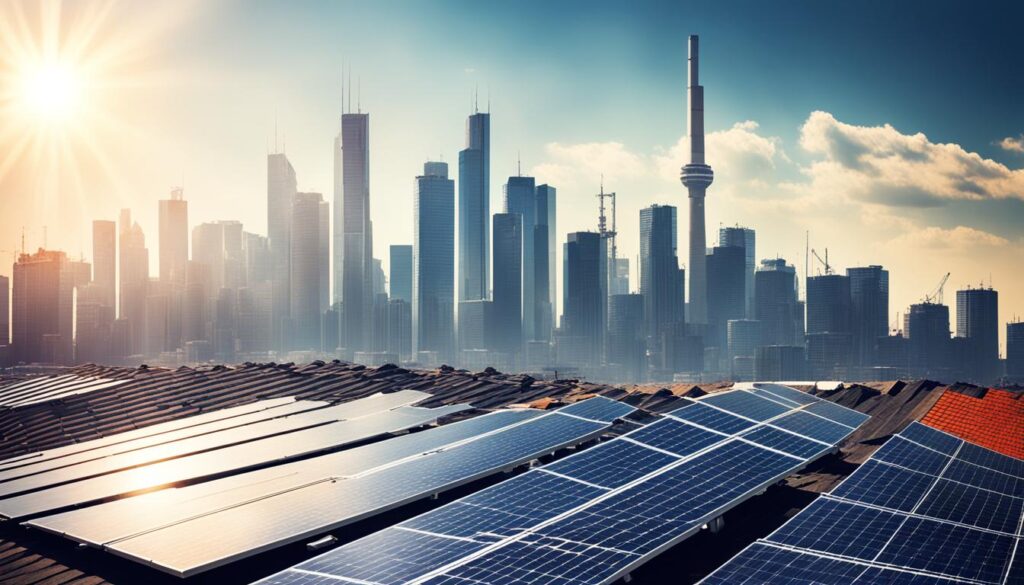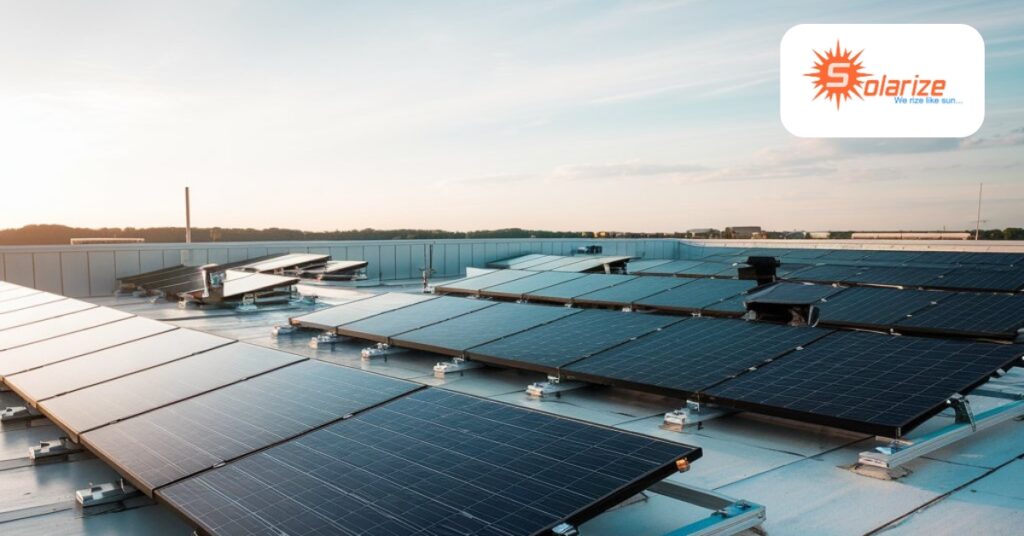As businesses look for sustainable and cost-effective energy solutions, commercial solar panel installation for buildings is becoming increasingly popular. Investing in solar energy not only reduces electricity costs but also contributes to a company’s commitment to environmental responsibility. This comprehensive guide explores everything you need to know about installing solar panels in commercial settings, from assessing energy needs and selecting the right system to understanding installation processes and maintenance. Whether you’re a business owner or a facilities manager, this guide will help you navigate the journey to a more sustainable and energy-efficient future.
Solar panels are quickly becoming the preferred option for commercial buildings as companies seek for more environmentally friendly alternatives. In addition to being a more environmentally responsible option than traditional sources of energy, they can result in significant long-term cost savings. Everything you need to know about installing solar panels on commercial buildings, including the benefits, the planning process, and how to proceed, will be covered in this extensive guide.
1. Benefits of Solar Panel Installation for Commercial Buildings

a. Financial Gains
Lowering energy expenses is one of the main reasons for companies to install solar panels. With solar panels, you may significantly reduce your energy costs by harnessing the power of the sun. Commercial businesses would do well wise to invest in solar panels because the initial cost can be recouped over time by the savings from lower power bills.
b. Effect on the Environment
Reducing reliance on fossil fuels and emissions of greenhouse gases, solar energy is a clean, renewable resource. Commercial buildings can dramatically reduce their carbon footprint by adding solar panels, which will both benefit the environment and enhance the company’s sustainability credentials.
c. Self-Sufficiency in Energy
Installing solar panels increases a company’s energy independence. Businesses can produce their own electricity and protect themselves against future power outages and increased energy costs by doing so rather than depending entirely on the grid.
d. Tax benefits and government incentives
Businesses who engage in solar energy can take advantage of a number of government incentives and tax breaks. These can include tax incentives, rebates, and accelerated depreciation, all of which assist in lowering the initial expenses associated with installing solar panels.
2. Key Considerations Before Installing Solar Panels
a. Roof status and available space
It’s critical to evaluate your building’s roof quality prior to adding solar panels. A strong, clean roof with enough room is essential for a solar installation to be successful. Roofs in need of repair ought to be taken care of before installation gets underway.
b. Assessment of the Use of Energy
For your commercial solar panel installation for commercial building to have an efficient solar panel system, you must understand how much energy it uses. Your peak usage periods, overall energy requirements, and possible areas for energy reductions can all be learnt during an energy audit.
c. System Architecture and Size
Budget, available roof space, and the energy requirements of your structure will determine the size of your solar panel installation. PV Solarise Energy System Pvt Ltd, a solar installation firm, can assist in designing a system that improves efficiency and returns on investment.
d. Return and Budgeting
Installing solar panels requires a large financial commitment. Making an informed selection will be aided by a thorough financial plan that includes cost estimates, financing possibilities, and an estimated return on investment. In five to ten years, the majority of commercial solar installations pay for themselves, depending on energy prices and available subsidies.
3. The Solar Panel Installation Process
a. Site Evaluation and Discussion
A site assessment is the first step in the solar installation procedure. This entails assessing the structure, shading, orientation, and energy usage trends of your roof. The solar provider will talk to you about your objectives during this session and suggest a solution that best suits your requirements.
b. Design and Proposal
After the site assessment, the solar provider will create a customized design for your building. This proposal will include the system layout, projected energy production, cost estimates, and a timeline for installation. It’s important to review this proposal carefully to ensure it meets your expectations and budget.
c. Licenses and Acceptances
Several licenses and licenses from local authorities are needed in order to install solar panels. The relevant paperwork, such as applications for utility hookup agreements, building permits, and electrical permits, will be handled by your solar provider.
d.Installing and Examining
The installation process can start as soon as the permits are obtained. The solar installation crew will attach the panels, set up the inverters, and wire the system into the electrical grid of your building. A few days to a few weeks are often needed for this process, depending on the size of the system.
A comprehensive assessment following installation guarantees that the system is secure and complies with local laws. Your system is prepared for activation after it passes the examination.

4. Maintenance and Monitoring of Solar Panels
b. Keeping an eye on system performance
The majority of commercial solar installations have monitoring devices installed to keep tabs on system operation and energy production. These devices can notify you of any problems, such reduced output or malfunctions, so you can schedule maintenance right away.
a. Continual Upkeep and Examination
Although regular cleaning and inspection are necessary to ensure optimal performance, solar panels require very little maintenance. Periodic cleaning is advised since dust, debris, and bird droppings can lower efficiency.
b. Guarantee and Assistance
While inverters only have a roughly 10-year warranty, solar panels typically have a 20–25 year warranty. Make sure the solar company you choose provides thorough support and maintenance services to handle any problems that may arise over the system’s lifetime.
c. Monitoring System Performance
Most commercial solar installations come with monitoring systems that track energy production and system performance. These systems can alert you to any issues, such as decreased output or faults, allowing for prompt maintenance.
5. Choosing the Right Solar Provider
Choosing a trustworthy solar supplier is essential to a successful installation. Seek out businesses with a solid track record, positive client feedback, and extensive service options. PV Solarize Energy System Pvt Ltd is a reliable supplier can help you every step of the way, from first consultation to after-installation assistance.
a. Knowledge and proficiency
Select a solar supplier with a wealth of commercial installation experience. They must to have experience designing and implementing systems that satisfy your particular requirements, as well as a portfolio of finished projects.
b. Equipment Quality
Make sure the supplier employs high-quality inverters, solar panels, and other parts. Your solar installation’s longevity and performance will be directly impacted by the equipment’s durability and efficiency.
c. Assistance and Customer Service
Effective customer support is essential to a seamless installation procedure. It is imperative that your provider provides unambiguous communication, open and honest pricing, and timely resolution of any queries or issues.
a. Integration of Battery Storage
An increasing number of business buildings are combining energy storage with their solar arrays as battery technology advances. Businesses can further lessen their dependency on the grid by using batteries to store extra energy produced during the day for usage at night or during peak hours.
b. Smart Solar Systems
Smart solar systems use advanced monitoring and automation to optimize energy production and usage. These systems can adjust to changing weather conditions, peak energy demands, and other variables, ensuring maximum efficiency. Solar Panel Installation for Commercial Buildings is the important part of the installation.
c. Innovations in solar panels
With ongoing advancements in panel efficiency, materials, and installation methods, the solar industry is always changing. Businesses can make well-informed decisions about future expansions or improvements to their solar installations by keeping a watch on these developments.
Conclusion
Solar panel installation is a smart investment for commercial buildings looking to reduce costs, improve sustainability, and gain energy independence. By carefully planning your installation and choosing a reliable provider, you can ensure a successful transition to solar energy. PV Solarize Energy System Pvt Ltd is here to support your journey toward a greener future with expert solar installation services tailored to your commercial needs.
FAQ
1. How much does it cost to install solar panels on a commercial building?
The cost of solar panel installation for commercial buildings varies depending on factors such as the size of the system, the type of panels used, and the complexity of the installation. On average, commercial solar installations can range from $50,000 to $500,000 or more. It’s important to consider the long-term savings on energy bills and the availability of government incentives, which can significantly offset the initial investment
2. How long does it take to install solar panels on a commercial building?
The installation timeline for commercial solar panels depends on the system size, site conditions, and the permitting process. Typically, the entire process—from the initial consultation and site assessment to installation and inspection—can take anywhere from a few weeks to a few months. The actual installation phase usually takes a few days to a couple of weeks, depending on the complexity of the project.
3. What maintenance is required for commercial solar panels?
Solar panels require minimal maintenance, but regular cleaning and inspections are recommended to ensure optimal performance. Dust, debris, and other obstructions can reduce the efficiency of the panels, so periodic cleaning, especially in areas with high pollution or frequent dust storms, is advisable. Most systems also come with monitoring tools to alert you to any issues, allowing for timely maintenance
4. Can solar panels provide all the electricity needed for a commercial building?
Yes, solar panels can potentially provide all the electricity needed for a commercial building, but it depends on factors like the building’s energy consumption, available roof space, and the efficiency of the solar system. In some cases, businesses may need to supplement solar energy with power from the grid, especially during high-demand periods or when sunlight is insufficient. Adding battery storage can help increase energy independence by storing excess energy for use during peak times or at night.

